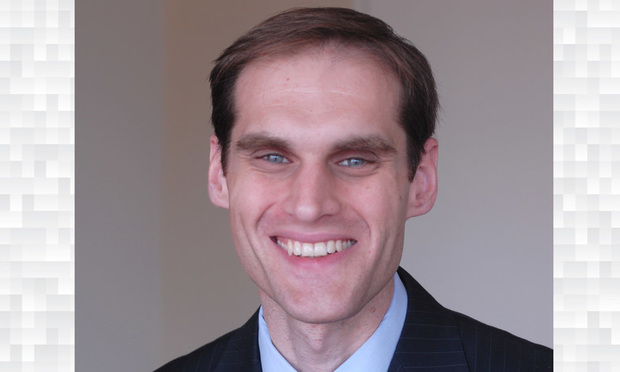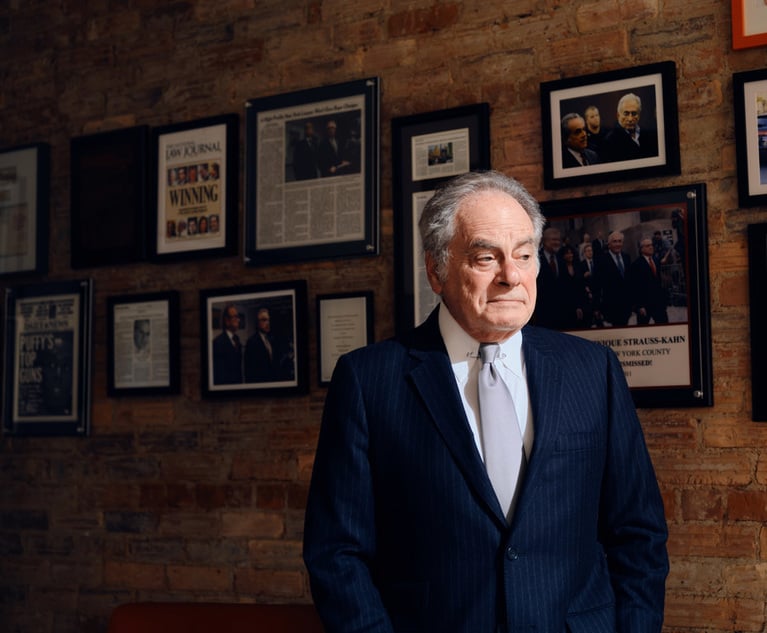Litigator of the Week: When a $2.38B Payout Is a Win
Willkie Farr & Gallagher partner Todd Cosenza steered a legacy multibillion dollar Lehman Brothers case through years of litigation, coming out on top after a grueling bench trial.
March 16, 2018 at 01:27 PM
5 minute read
The original version of this story was published on Litigation Daily

When the nearly decade-long proceedings in the Lehman Brothers bankruptcy finally went to trial last year, investors who said they were hurt by the bank's collapse wanted to pick $11.4 billion off the bones of its estate.
But a team led by Willkie Farr & Gallagher partner Todd Cosenza representing the plan administrators for Lehman lowballed the trustees by $9 billion, arguing that the fair and reasonable payout for all creditors was $2.38 billion.
And after slogging through a grueling, 23-day estimation trial spread over three months, in which the parties pored over thousands of loan files underlying residential mortgage-backed securities—an experience that U.S. Bankruptcy Judge Shelley Chapman of the Southern District of New York said was “one of the most difficult, if not the most difficult, thing I have ever done” —the judge sided with Cosenza and his team.
Once the fourth-largest investment bank, Lehman Brothers made the biggest Chapter 11 filing in history in September 2008. Bankruptcy proceedings for Lehman have paid out roughly $122 billion for creditors, The Wall Street Journal reports.
During the case, a rift developed between the trustees, which were comprised of hedge funds and institutional investors. Fourteen institutional investors—making up about 24 percent of the unpaid balance on Lehman's RMBS —ended up opting out of the effort and last year took a $2.4 billion settlement.
The attorneys for the remaining trustees, a sprawling team from Holwell Shuster & Goldberg, forged ahead to trial, and they came to play. They sought damages for a gargantuan 193,148 breach of contract claims on more than 94,500 loans, and the case law thus far was “not entirely positive” for the plan administrators, Cosenza said.
“They had the winds to their back,” Cosenza said.
The trustees representing the securities holders are Deutsche Bank National Trust Co., Law Debenture Trust Co. of New York, U.S. Bank National Association and Wilmington Trust Co., court papers state.
Characterizing the trustees' attorneys as taking a “blunderbuss” approach, Cosenza's team fired back, arguing that the trustees would not be able to meet their burden of proof because they used a flawed review process for the loans.
Cosenza was able to cut a deal in the trial that he saw as crucial to his team's ultimate victory: he would agree to an expedited schedule for discovery if he would be allowed to submit expert economic testimony on the value of other settlements. That included the settlement reached with the trustees who opted out, which Cosenza said was persuasive for Chapman.
In the middle of discovery, the trustees—for reasons cloaked in privilege—decided not to pursue 40 percent of their claims, reducing the number of loans in dispute to less than 72,000.
On March 8, ruling from the bench, Chapman found for Lehman. The judge concluded that the “industry standard” the trustees were trying to apply in the case had flaws; notably, she said, no representatives from the trustees' loan review firms testified at trial.
Among other issues, Chapman said, the trustees' loan reviewers made mistakes in determining borrowers' income levels based on income tax returns. In one example, the judge cited a loan to a registered nurse who said her annual income was more than $165,000. But the trustees had tried to argue that she lied about her income based on Bureau of Labor Statistics data that the vast majority of nurses in her area made something closer to $95,000.
“This is a real testament to someone doing the legwork in a neutral way,” Cosenza said of Chapman.
Cosenza also credited his team's win to the fact that, almost 10 years since the financial crisis, courts are taking a more nuanced view of these cases and not always deferring to trustees.
“I think that judges looked at banks as having a real role in the financial crisis,” Cosenza said.
The team from Willkie Farr representing the Lehman plan administrators also included Joseph Davis, Benjamin McCallen and Paul Shalhoub.
The Willkie team was joined by Greenwood Village, Colorado-based Rollin Braswell Fisher attorneys Michael Rollin and Maritza Dominguez Braswell, who served as local counsel for the plan administrators; and Matthew Cantor and William Olshan of the Lehman Brothers Holdings in-house legal team.
Holwell Shuster partner Michael Shuster, who led the team representing the trustees, declined to comment on Chapman's ruling, but commended his adversary for remaining steadfast in his strategy.
“Todd is a smart lawyer who's good at devising a strategy to get his client to its objective and then executing on and sticking to that strategy through the twists and turns of a case,” Shuster said of Cosenza.
Shuster's team included Holwell Shuster attorneys Dan Goldberg, Dwight Healy, Dorit Black,Neil Lieberman, Lani Perlman, Eileen Delucia, Karen Sebaski, Tim Grinsell, Wendy Green, Laura Aronson, Brendon Demay, Ben Heidlage and Sarah Sternleib.
This content has been archived. It is available through our partners, LexisNexis® and Bloomberg Law.
To view this content, please continue to their sites.
Not a Lexis Subscriber?
Subscribe Now
Not a Bloomberg Law Subscriber?
Subscribe Now
NOT FOR REPRINT
© 2025 ALM Global, LLC, All Rights Reserved. Request academic re-use from www.copyright.com. All other uses, submit a request to [email protected]. For more information visit Asset & Logo Licensing.
You Might Like
View All
A Lesson on the Value of Good Neighbors Amid the Tragedy of the LA Fires

Working Across the 'Entire Ecosystem' Propels Ropes & Gray's Life Sciences Practice

For Paul Weiss, Progress Means 'Embracing the Uncomfortable Reality'
5 minute read
Ben Brafman Reflects on Nearly 50 Years as a Defense Attorney
Trending Stories
Who Got The Work
J. Brugh Lower of Gibbons has entered an appearance for industrial equipment supplier Devco Corporation in a pending trademark infringement lawsuit. The suit, accusing the defendant of selling knock-off Graco products, was filed Dec. 18 in New Jersey District Court by Rivkin Radler on behalf of Graco Inc. and Graco Minnesota. The case, assigned to U.S. District Judge Zahid N. Quraishi, is 3:24-cv-11294, Graco Inc. et al v. Devco Corporation.
Who Got The Work
Rebecca Maller-Stein and Kent A. Yalowitz of Arnold & Porter Kaye Scholer have entered their appearances for Hanaco Venture Capital and its executives, Lior Prosor and David Frankel, in a pending securities lawsuit. The action, filed on Dec. 24 in New York Southern District Court by Zell, Aron & Co. on behalf of Goldeneye Advisors, accuses the defendants of negligently and fraudulently managing the plaintiff's $1 million investment. The case, assigned to U.S. District Judge Vernon S. Broderick, is 1:24-cv-09918, Goldeneye Advisors, LLC v. Hanaco Venture Capital, Ltd. et al.
Who Got The Work
Attorneys from A&O Shearman has stepped in as defense counsel for Toronto-Dominion Bank and other defendants in a pending securities class action. The suit, filed Dec. 11 in New York Southern District Court by Bleichmar Fonti & Auld, accuses the defendants of concealing the bank's 'pervasive' deficiencies in regards to its compliance with the Bank Secrecy Act and the quality of its anti-money laundering controls. The case, assigned to U.S. District Judge Arun Subramanian, is 1:24-cv-09445, Gonzalez v. The Toronto-Dominion Bank et al.
Who Got The Work
Crown Castle International, a Pennsylvania company providing shared communications infrastructure, has turned to Luke D. Wolf of Gordon Rees Scully Mansukhani to fend off a pending breach-of-contract lawsuit. The court action, filed Nov. 25 in Michigan Eastern District Court by Hooper Hathaway PC on behalf of The Town Residences LLC, accuses Crown Castle of failing to transfer approximately $30,000 in utility payments from T-Mobile in breach of a roof-top lease and assignment agreement. The case, assigned to U.S. District Judge Susan K. Declercq, is 2:24-cv-13131, The Town Residences LLC v. T-Mobile US, Inc. et al.
Who Got The Work
Wilfred P. Coronato and Daniel M. Schwartz of McCarter & English have stepped in as defense counsel to Electrolux Home Products Inc. in a pending product liability lawsuit. The court action, filed Nov. 26 in New York Eastern District Court by Poulos Lopiccolo PC and Nagel Rice LLP on behalf of David Stern, alleges that the defendant's refrigerators’ drawers and shelving repeatedly break and fall apart within months after purchase. The case, assigned to U.S. District Judge Joan M. Azrack, is 2:24-cv-08204, Stern v. Electrolux Home Products, Inc.
Featured Firms
Law Offices of Gary Martin Hays & Associates, P.C.
(470) 294-1674
Law Offices of Mark E. Salomone
(857) 444-6468
Smith & Hassler
(713) 739-1250








